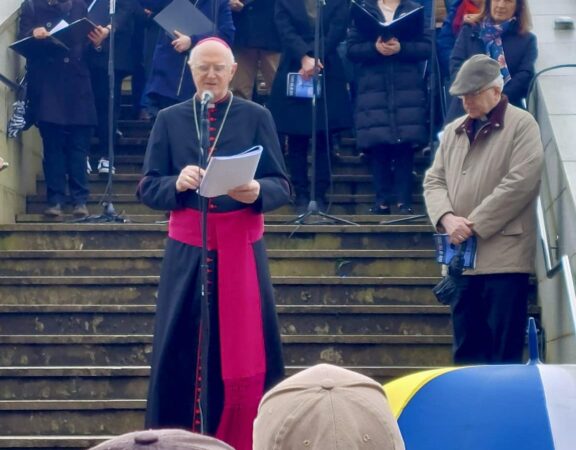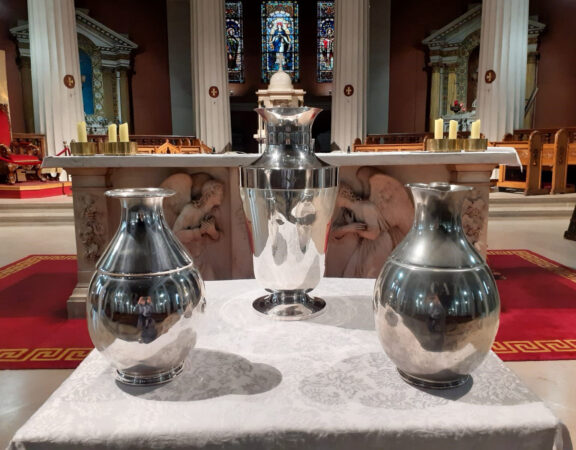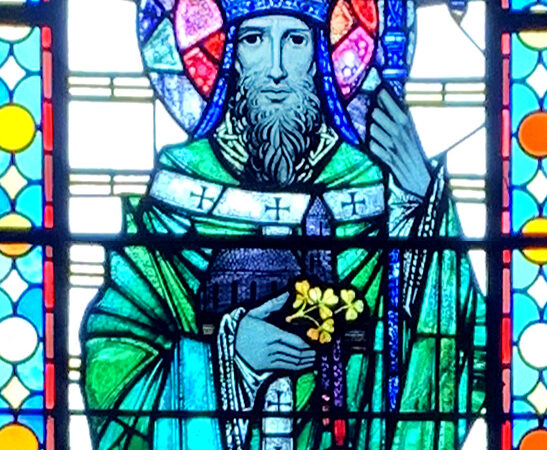Feast of the Holy Guardian Angels 2014
SCHOOLS MASS 2014
Homily notes of Most Rev. Diarmuid Martin Archbishop of Dublin
Holy Cross College, Clonliffe, 2nd October 2014
“We gather this evening, as we do each year at this time, to call down God’s blessing on the new School year and on all those who belong to the educational community within the Archdiocese of Dublin.
This year our celebration falls on the Feast of the Holy Guardian Angels. Guardian Angels are a sign of something deeper. They are a sign of the fact that God protects. The God revealed in Jesus Christ is not a God who spies on our interior life in order to catch us out and judge us and condemn us.
God has never created any person that he does not love. God’s love never diminishes. The very nature of God is that he holds us in his powerful hand as a hand that protects. In all the choices and challenges of our lives God is with us and accompanies us on our life’s journey. In our good moments and when things begin to burden us and even in our darkest moments we should always remember: God protects us and we are never alone. Education then also means helping young people who encounter moments of darkness that they should never feel alone.
There is a sense in which the work of educators is an extension of the work of God, that work of protecting and fostering the good that is in each one of our pupils and allowing them to flourish. It is the process of protecting and enhancing the unique individuality of each of our students.
The Gospel reading reminds us that children are a sign of kingdom of God. What does that mean? It has a double consequence. Firstly, children must be treated with respect and special care, in the sense that our attitude to children reflects how we understand the kingdom and how we understand God.
Those who neglect or abuse or disregard a child always indicate through their lives that they badly misunderstand who God is or even reject God. There is a sense also that one of the prime ways of determining whether a society is truly Christian or not is by looking at the way that our society treats all its children.
The assertion that children teach us something of the kingdom of God also means that all of us must learn from children, from their innocence and their fragility, from the fact that they are filled with hope for their future or that they can be filled with anxiety and uncertainty about the future. Becoming like a child means removing all arrogance from our hearts and any sense of self-importance and realising that none of us is self-sufficient on our own.
If we truly cherish the children of Ireland it means that we will work together to ensure that all our children can enjoy the most favourable possible environment for their education.
The environment of a school is not just in brick and mortar and facilities, although these are vital. The overall ethos of a school is also a determining factor in assessing educational excellence. Ethos is not just something vague. It is something which penetrates the entire philosophy and inspiration of the school. It is not just something that appears within a framed Mission Statement at the main entrance to a school. It is rather something that strikes you in the face the very moment you enter the front door of a school. It is an attitude which places the pupil at its centre, where the pupil is seen as a young person filled with dreams and hopes for a future, and the ability to unleash potential.
In the past very often schools in Ireland were very conformist. Today, we realise that the aim of education is to respect creativity and allow the young person to follow his or her dreams and to become not just the person that we think they should be, but what they themselves dream they can be.
A school is an educational community and ethos is enhanced or weakened depending on the quality of that community. Maintaining such a community requires that the specific dignity of every component of that community be respected. We have great teachers in Ireland. Irish society must ensure that teachers receive the recognition they deserve, financially, in terms of social standing and in terms of the manner in which their professional concerns are addressed and supported.
The training and lifelong formation of teachers is also vital. Here in Dublin we are moving to new partnerships, in which Saint Patrick’s College Drumcondra, the Mater Dei Institute and the Church of Ireland College of Education, are working with Dublin City University towards the establishment of a world class institute of education. We are living in a world of revolution in education. There is no future for an Ireland which is not in the forefront of digital education and in new forms of education which will equip our young people for employment in the world of the future.
Faith can and does play a role in the future of Irish education and not just in a marginal way. Faith can give the young person a different way to look on the meaning of life. Faith is not a hindrance to authenticity but something which can give an added quality to the life of the young person. Our faith is in a God who loves and who is the source of a hope which we ourselves could never generate.
There are certain sectors within secular society which can be almost allergic to any explicit mention of faith within a public educational system. We need to reassure them that faith cannot be imposed and one should not attempt to impose it. But when faith gives one an added dimension, one which enriches what is purely technical, that contribution should be welcomed by all.
Indeed the common desire towards a vision of a pluralist Ireland which both those who hold a secular viewpoint of life and those whose lives are faith inspired will only be achieved through a process of mature dialogue, respectful discussion of differences and a sharing of common concerns.
Those common concerns must also include a vision of education which goes beyond in a self-centred vision of what we can achieve or by ourselves. Education is not just centred on my achievement, but what I can do through my talents to ensure that the world we live in is a better, a more just and a more caring and a more protective place.
The challenge facing us is great. In this Archdiocese of Dublin 18% of the population is under 9 years of age and there are more children under 4 than people over 70. The youthfulness of our population means that our needs in the educational field are growing and growing rapidly. There is very little time to prepare in such a way that every one of those young children will feel that they have real access to the educational services they require.
That is the challenge we face and we must respond to that challenge in a spirit of working together and generosity. We owe it to the children of the future and we ask God’s protection on all of them. ENDS









